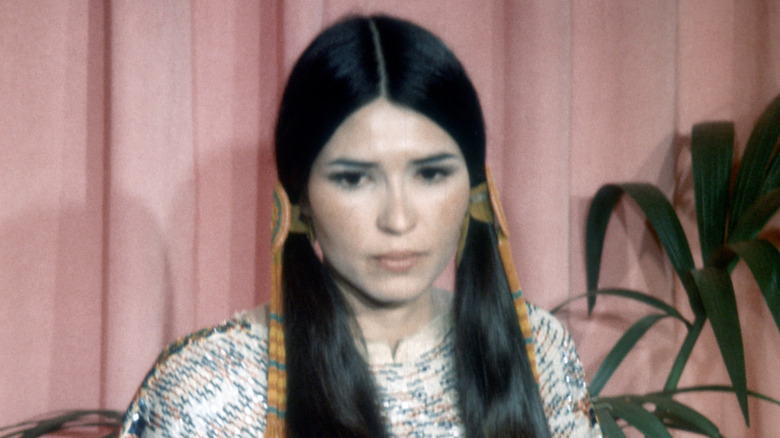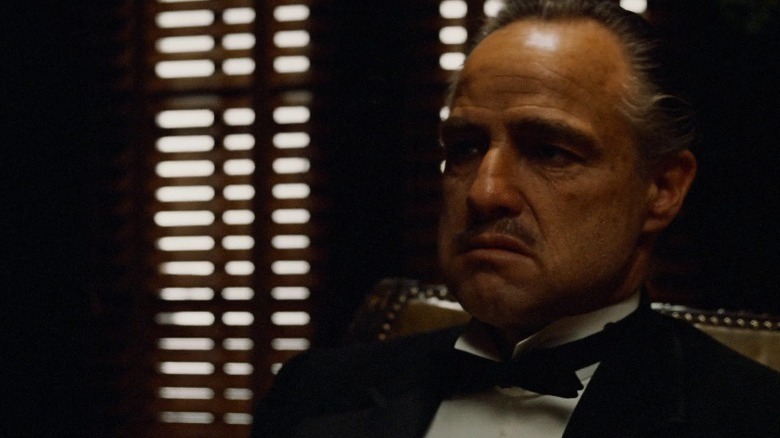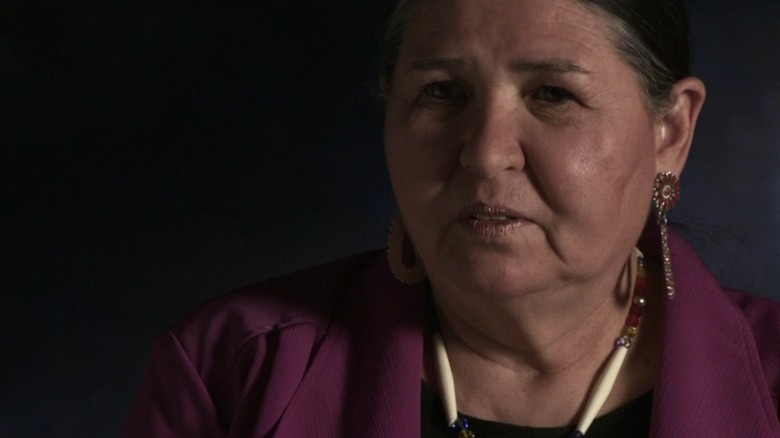Why The Academy Owed Sacheen Littlefeather A Long-Overdue Apology
This week, the Academy of Motion Picture Arts and Sciences attempted to right a decades-old wrong with an apology. The Hollywood Reporter broke the news that the Academy privately presented Native American activist and former actress Sacheen Littlefeather with a statement apologizing for her public mistreatment at the 45th Academy Awards. Littlefeather, who is Apache and Yaqui, is 75 years old now, but she was just 26 when she stepped up to the stage to decline Marlon Brando's best actor award and speak about America's mistreatment of Indigenous peoples in 1973.
The actor won the award for his role in "The Godfather," but sent Littlefeather to speak on his behalf with at least eight pages of his remarks typed in advance. The moment that followed is a black mark on the history of the Academy. Littlefeather has since revealed that she wasn't allowed to read Brando's statement, as show producer Howard Koch told her she would be arrested by security if she spoke for more than 60 seconds. That pretty much set the tone for the next few moments, which were captured live on television as part of the telecast.
Littlefeather represented Brando on stage
After telling the audience that she wouldn't be able to read Brando's full comments, Littlefeather improvised a very short version of his speech. "He very regretfully cannot accept this very generous award, and the reasons for this being are the treatment of American Indians today by the film industry," Littlefeather said, before a short pause that was interrupted by both loud boos and applause. "And on television and in movie reruns, and also with recent happenings at Wounded Knee."
One month earlier, the Occupation of Wounded Knee had begun, and the standoff between federal agents and the American Indian Movement would ultimately last 71 days and result in bloodshed. In the documentary "Reel Injun," Lakota activist Russell Means said that he and others watched Littlefeather's speech from Wounded Knee, and it raised their morale during a time when they weren't sure they'd make it out of the occupation alive. "Marlon Brando and Sacheen Littlefeather totally uplifted our lives," he told documentarians.
Littlefeather spoke briefly and considerately, ending the speech with a message of hope: "I beg at this time that I have not intruded upon this evening and that in the future, our hearts and our understandings will meet with love and generosity." Despite the message of peace, booing audience members and a threatening producer weren't the only people in the room who treated her with hostility. Littlefeather spoke to the Academy's website A-Frame this week and described the way that popular Western actor and noted racist John Wayne had to be held back, saying: "He came forth in a rage to physically assault and take me off the stage. And he had to be restrained by six security men in order for that not to happen."
Finally, an official apology
Littlefeather says that people in her line of sight were performing a mocking "tomahawk chop" gesture, and some even reportedly imitated Indigenous war cries. After the moment was over, her life was changed forever. "A lot of cheap shots were thrown at me," she told the Academy. "There were a lot of rumors, gossip columnists that were trying to make it something that it was not. And I was boycotted from every talk show while people talked about me." Littlefeather never even got to read Brando's full typed comments until 2018, when she shared them on Native Trailblazers radio (via Indian Country Today).
Littlefeather was already a notable Native American activist at the time of her Oscars appearance, having participated in the months-long occupation of Alcatraz in 1969. Brando, too, visited Alcatraz during the protest for Native American sovereignty. When she spoke at the Oscar podium, Littlefeather also noted that she was president of the National Native American Affirmative Image Committee. "I knew that I paid the price of admission so that others could follow," she later told the Academy of her groundbreaking moment on the world stage.
The activist is set to be honored on September 17, 2022, at the Academy Museum in Los Angeles, where she will sit in conversation with producer Bird Runningwater. This comes after Littlefeather received a letter from previous Academy president David Rubin apologizing for the shameful events that night in 1973. Here's part of the Academy's statement, as shared by THR:
"The abuse you endured because of this statement was unwarranted and unjustified. The emotional burden you have lived through and the cost to your own career in our industry are irreparable. For too long the courage you showed has been unacknowledged. For this, we offer both our deepest apologies and our sincere admiration."
Passing the baton to a new generation
Littlefeather has never stopped advocating for Indigenous rights and on-screen representation and immediately responded to the news of the apology by paying tribute to Native American artists who have broken through in the film and television industries, including Academy Inclusion Advisory Committee members Runningwater and Heather Rae, actor Wes Studi, and "Reservation Dogs" co-creator Sterlin Harjo. She was also frank about the less-than-perfect timing of the apology, saying, "Yes, there's an apology that's due. As my friends in the Native community said, it's long overdue. I could have been dead by now."
Luckily, Littlefeather is still with us, and still sharing wisdom and insight about the incident that forced Hollywood to look itself in the mirror decades later. "When I was up there refusing the award, I dreamed about someone like [my niece] Calina," she told the Academy. "Someone who would break through the barriers and do her own thing, whether doors would be open. And where she would be able to go through them, to be able to make her dreams come true, of singing, of acting and doing. This is what I did. She is the beginning of a whole new agenda. And so, I passed the baton on to her. And I do it gratefully and thankfully."


